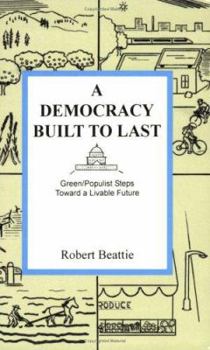A Democracy Built to Last: Green/Populist Steps Toward a Livable Future
A political essay on sustainability and critique of the current dogma of economic growth as the aim of public policy. This book explains how we might reduce growing damage to the natural world while... This description may be from another edition of this product.
Format:Paperback
Language:English
ISBN:0977797104
ISBN13:9780977797103
Release Date:November 2006
Publisher:Applecart Books
Length:327 Pages
Customer Reviews
1 rating
Passion and Sweat
Published by Thriftbooks.com User , 17 years ago
Once, in graduate school, I went to a horrendous, ugly, abominably structured and boring mathematics colloquiam. It was so badly done and so badly presented that I thought no person could approve it. Hours after the colloquiam, I happened to see the famous mathematician Olga Taussky Todd walking alone on campus. I asked her for her views on the colloquiam, thinking that I would force a member of the intellectual elite to admit that something was rotten in academia. She replied, "I cared for it." She went on to say that the subject matter was both profoundly important and very difficult. So, she approved of any sincere effort to deal with it. Professor Taussky Todd was very able, and she had a policy of kindness that was not common among faculty at that most excellent institution. I ought to have liked this book. The subject matter is so important, and the author has worked so [...] the book, that I ought to like it. He has tackled the most difficult subject of our day at the broadest level. He asks the hard question of how our societal institutions and their underlying philosophies have to change in order to harmonize with a natural environment coming under increasing stress. In effect, he's asking the question of how society will continue to survive. So, it's a very interesting subject. Further, the author has worked very hard. In this book, he has included a very broad survey of the current status of this question, omitting no important point of view of which I am aware. So, the coverage is somehow almost encyclopaedic. That took a lot of work (or I suppose it did). That's why I think the author "sweat" to write this book. He also writes with the passion that survival itself would inspire. Those are the reasons that I ought to like this book. Those are the reasons that reasonable people might choose to read this book. The fact that I ought to like the book doesn't mean that I really did. In polite company, I suppose I would be more or less required to claim that I like the book. I don't really like it, though. Two qualities are missing. First, I was disappointed that I didn't find newer and more useful solutions in the book. If you read Forbes magazine, you will realize that many important people are not environmentalists. Those people either need to be enlisted in a useful way in getting a solution or they need to be bypassed by newer and more elegant solutions. I saw no particularly new or useful way of reconciling the opposing points of view. So, I saw the book more as a static record of what is wrong and less as a guideline of how to get better. It's good, but not all I could want. Second, the passion of the writing will not be welcome to everyone. It can sound preachy to an unsympathetic ear. Because the coverage of the book is so wide-spectrum, there is no possibility of offering the sort of extremely tightly reasoned arguments on important issues that would actually convince the opposing point of view.






